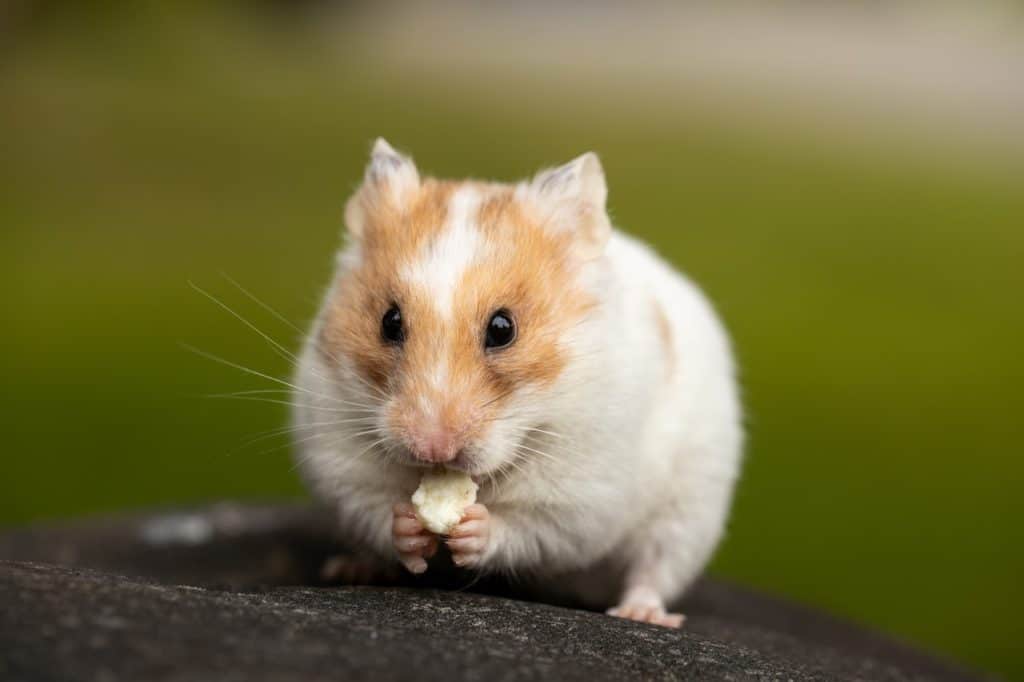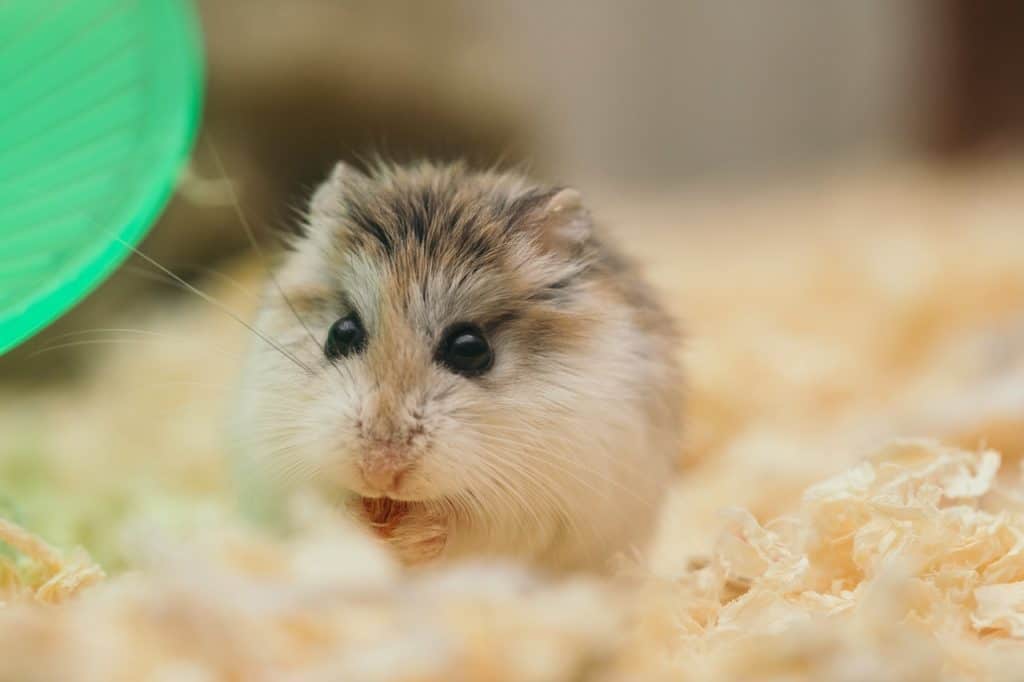
So, you’re looking for answers to questions that are related to hamsters and loud sounds. You’ve come to the right place as I’ve done my best to search for all the frequently asked questions that are related to this topic. In the first part of the article, I’ll give answers to questions that are related to hamsters being exposed to loud sounds and in the second part of the article, I’ll answer questions that are related to loud sounds that hamsters make themselves.
Can hamsters hear well?
Hamsters can hear very well. Their hearing is way better than their eyesight and they communicate with each other through high frequencies that can’t be heard by humans. Once they hear a sound that’s unusual to them, they freeze and use their hearing and smell to find out what it was.
So, you can be sure that if you put the music on the loudest you can handle that it will be way too loud for the hamster to handle if he/she happens to be in the same room with you.
Are loud sounds dangerous to hamsters?
Loud sounds can be dangerous to hamsters. The hearing of hamsters is extremely good and therefore loud sounds can truly be intimidating to the hamster in question. It can be stressful to hamsters and stress in hamsters can result in certain diseases like the “wet-tail disease”.
Now, this does not mean that they’ll immediately get a disease like the wet-tail disease if you put some loud music on. As they can probably cope with loud noises from time to time. But you must respect the hamster’s needs as well which is a peaceful environment.
Can hamsters die from loud noises?
They can’t die from loud noises directly. But the result that the loud noises can have on the hamster’s well-being can result in death. Frequent loud noises will cause the hamster to become stressful and stress in hamsters can lead to diseases, like the wet-tail disease which can result in death.
The wet-tail disease is a disease that is mostly found in baby hamsters because they are more susceptible. But also older hamsters can get the disease. Symptoms to look out for are the hamster having a wet tail, a lack of interest in food, a lack of energy, diarrhea, a foul smell, getting way more sleep than usual, having folded ears, walking with a hunched back, and unusual behaviors like biting. If your hamster is showing one or more of these symptoms and you don’t trust it then be sure to bring it to a veterinarian as soon as possible. The wet-tail disease requires immediate treatment and even with the appropriate treatment, the hamster can still die within 48-72 hours.
Are hamsters ok with loud noises?
Hamsters are not okay with frequent loud noises but can deal with loud noises from time to time. It’s important to keep in mind that every hamster is going to respond differently to loud noises which means that one can be okay with frequent loud noises and the other gets stressed immediately.
In general, I would recommend you not expose your pet hamster to too many loud noises. So, if you get the urge to listen to some loud music then make sure your pet hamster isn’t in the same room. Also, if you’re vacuuming in the room where the hamster is as well then make sure that you monitor how the hamster is reacting to the vacuuming noises and put him/her in another room if you see your hamster reacting scared to the noises.

Are hamsters scared of loud noises?
Every loud noise that a hamster is not used to can cause the hamster to become scared. They can hear exceptionally well and loud noises can therefore be interpreted by the hamster as a true danger and as something to be scared of.
Now, you should keep in mind that even though hamsters can get used to certain loud noises that even these noises can cause the hamster to stress out because most loud noises like, for example, loud music, will be turned on randomly and the hamster won’t expect it.
As you’ve read so far, hamsters can truly be intimidated by loud sounds and it can even cause illnesses to develop in the hamster if the loud noises are too frequent and cause too much distress.
Hamsters, however, can also produce some loud noises themselves, and next, I’ll be answering commonly asked questions that are related to hamsters being loud themselves.
Are hamsters loud?
Hamsters can be loud. Especially at night because they normally sleep during the day. Sounds that he/she is going to make are digging sounds, squeaking sounds, and if you give the hamster a hamster wheel to exercise in then you can be sure that the hamster wheel will make sounds as well.
Once these running wheels for hamsters get older, they tend to become louder so that’s another thing to keep in mind when you decide to get one of these running wheels. For hamsters, it is normal to be active at night because they are nocturnal which means that they are active during the night and sleeping during the day.
If you can’t get enough of learning about hamsters then I encourage you to check out the “Hamsters Category Page” which consists of various articles that give answers to hamster-related questions.
Why are hamsters loud at times?
There can be reasons for hamsters being loud at times. You can, for example, be sure that the hamster will make sounds once he/she knows that food comes after the sound of an opening fridge. But normally it’s just doing what the hamster wants to do which can be making loud sounds.
If these moments of loudness are keeping you awake then you should probably move him/her to a spot that’s further away from your bedroom. The loud sounds of your hamster at night will have a harder time reaching you when you do this.
Do hamsters make loud noises when they sleep?
Hamsters can make loud noises when they sleep. Usually, these noises start to pop up in hamsters when they get to an older age. Noises that hamsters will make are squeaking noises and potentially raspy noises.
Most of the time, the noises that are produced by the hamster in question during its sleep don’t mean anything. But it can be possible that the hamster has an infection if you happen to hear raspy noises. So, make sure that you keep a close eye on your hamster if you notice any raspy noises and bring him/her to a veterinarian if you don’t trust it.

Why is the hamster wheel of my hamster so loud?
There are mostly two different issues that can cause the hamster wheel to become loud. The first reason is that the wheel hasn’t been lubricated enough with oil, and the second reason is that the wheel is just too old and needs a replacement.
You should lubricate the wheel with, for example, vegetable oil from time to time during its lifetime. This will prevent the wheel from becoming noisy easily and you’re hamster will probably run better on it as well.
How do I get my hamster to be less loud?
They are just going to be loud no matter what. They do this because this is in their nature. There are things you can do to let the sounds that the hamster makes reach less far. Examples are buying a soundproof hamster cage, insulating the hamster cage, or soundproofing your pet’s entire room.
Other examples are moving the hamster cage to a spot in the house that is further away from your bedroom or buying a running wheel that is made of plastic or wood (which both will reduce the sound that it makes tremendously). All these possibilities will make your hamster less loud but it is even more powerful if you combine these options.
How to get your hamster to be quiet at night?
Although hamsters are active at night and will probably make noises, there are some things you can do to make your hamster quieter. Examples of ways to make your pet hamster quieter at night are:
- Playing with your hamster during the early evening will make the hamster more tired and therefore quieter during the night.
- Feeding your hamster in the early evening will make the hamster get used to waking up earlier which will result in him/her probably being more tired in the night.
- Remove its toys from its enclosure before you go to bed and put them back in the morning.
Two of the ways I’ve explained are based on changing the hamster’s sleeping schedule a bit but if you don’t want to do these things and removing the toys isn’t accomplishing anything either then make sure you take the soundproofing and insulating routes that I’ve explained to you during the question before this one.
What sounds do hamsters make?
Hamsters make sounds when they’re happy or unhappy and they can make sounds whilst asleep. Examples of sounds that they make are a squeaking sound, a hissing sound, a grinding sound, a squealing sound, a clicking sound, a screaming sound, a sneezing sound, a chirping sound, and a cooing sound.
All of these sounds have meanings behind them, for example, a squeaking sound means that the hamster in question is happy, a hissing sound, on the other hand, means that the hamster is in discomfort, and a sneezing sound can mean that your hamster is allergic to something.
Check out the video below if you want to see and hear cute hamsters make sounds.
Related questions
Should I cover my hamster’s cage at night?
You don’t have to cover the hamster’s cage at night. Hamsters are nocturnal animals that will mostly sleep during the day and are active at night. If, however, you want to encourage the hamster to be less active at night then covering its cage could help a bit.
Can I wake up my hamster?
It is best to wake up your hamster as close as possible to the time it would normally wake up. In this way, you won’t disturb the hamster’s sleep too much. Also, it’s best not to wake the hamster during the middle of the day as these times are normally the times he/she sleeps the deepest.
Do hamsters like music?
Hamsters do like music. They can even fall asleep to music if the music is peaceful enough. Examples of genres are classical or pop. Make sure though that you don’t put on any loud music because this won’t be peaceful for the hamster and may even cause him/her a lot of stress.
Conclusion
You now know a lot more about how well hamsters can hear when compared to humans and that loud sounds can indeed have lethal outcomes to hamsters if the sounds are causing the hamster too much distress. You also, know by now that hamsters can be loud themselves as well and that you can do something about these loud sounds if they happen to keep you awake at night. So, all in all, it’s important to respect your hamster’s living space and besides this, you have to be smart about where you put the hamster cage within your house as your pet hamster will not hold back on making loud sounds himself/herself.

